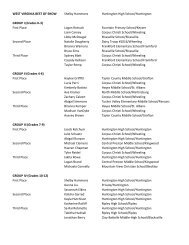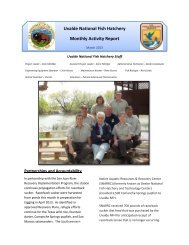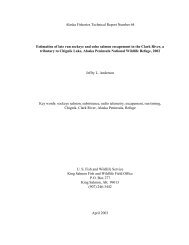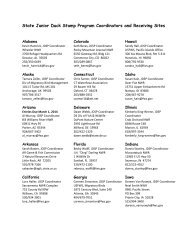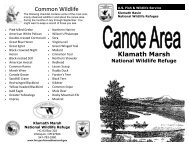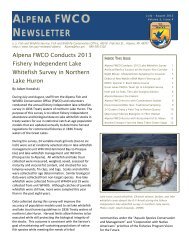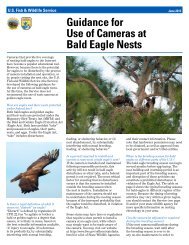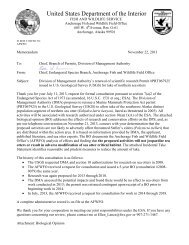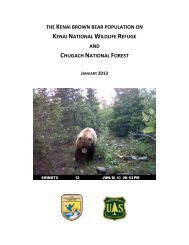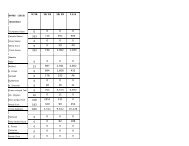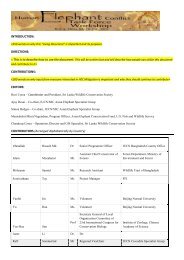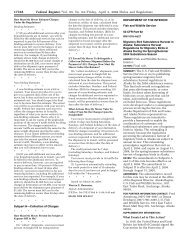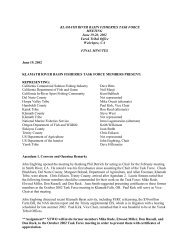Assabet River NWR Final CCP - U.S. Fish and Wildlife Service
Assabet River NWR Final CCP - U.S. Fish and Wildlife Service
Assabet River NWR Final CCP - U.S. Fish and Wildlife Service
You also want an ePaper? Increase the reach of your titles
YUMPU automatically turns print PDFs into web optimized ePapers that Google loves.
Eastern Massachusetts National <strong>Wildlife</strong> Refuge Complex Draft <strong>CCP</strong>/EA November 26, 2003<br />
populated area <strong>and</strong> hunting can pose safety risks. Additionally this will cause an influx of<br />
Police calls to the area to determine if hunters are on private property or refuge l<strong>and</strong>. Does<br />
the plan have any contingency to compensate the town for this added use of resources?”<br />
Displacement<br />
Many respondents aver that they will be unable to use the Refuge during hunting season. One<br />
respondent asks that the FWS “Exp<strong>and</strong> the Compatibility Determination analysis to include<br />
an assessment of recreational compatibility. This should include a determination that the<br />
conditions that motivated the past Refuge Manager to ban hunting have been alleviated.”<br />
Respondents argue that creating an exclusive use for significant portions of the year is unfair<br />
<strong>and</strong> unwise. Some respondents express significant concern for area recreationists over<br />
unmarked <strong>and</strong> porous boundaries between the Refuge, conservation l<strong>and</strong>, <strong>and</strong> residences,<br />
particularly where hunters might go off-trail. A typical respondent writes, “I am also opposed<br />
to hunting, not for moral reasons, but for safety reasons. I <strong>and</strong> my dogs were the target of a<br />
hunter at Great Meadows several years ago. I had to hit the ground <strong>and</strong> crawl behind a tree<br />
for safety. He didn't see me, though when he heard me, he took off in a hurry.”<br />
Some respondents complain that hunting season occupies optimal use times for the Refuge,<br />
one respondent stating that no one uses refuges in summer because “the deer flies will kill<br />
you.” Several respondents think along similar lines, suggesting reduced hunting opportunities<br />
to permit other recreation: “Maybe hunting could be limited to a few weekends per season,”<br />
writes one, while another suggests a couple days of hunting per week. Another respondent<br />
suggests things would be better “if you had one or two hunting days where experienced<br />
hunters signed up to do a ‘cull’ if you could actually get them to kill sick, old <strong>and</strong> slow<br />
individuals instead of the healthiest, biggest <strong>and</strong> most impressive animals—<strong>and</strong> those days be<br />
highly publicized so innocent people wouldn't be hurt.”<br />
Some respondents suggest that the only safe course of action is to close the Refuge to other<br />
uses during hunting season.<br />
To alleviate these concerns, some respondents argue that hunting should only be done by<br />
professionals paid by the refuge for wildlife management: “If the refuge needs to use deadly<br />
force to carry out the mission, have that applied by trained professionals <strong>and</strong> not by anyone<br />
with ten bucks <strong>and</strong> a shotgun.”<br />
Several respondents mention the need to educate both hunters <strong>and</strong> area residents on the<br />
schedule <strong>and</strong> placement of legal hunting. Several respondents talk about the need to increase<br />
law enforcement to deal with increased hunting, <strong>and</strong> some assert that the Refuge’s record of<br />
successful interdiction of motorized trespass <strong>and</strong> v<strong>and</strong>alism indicates a current inability to<br />
enforce laws, <strong>and</strong> little confidence that hunting can be safely policed.<br />
Dogs <strong>and</strong> Public Safety<br />
A number of respondents offer intensely felt comments advocating continued use of dogs on<br />
the refuge as a matter of personal safety. These respondents, all women, state that prohibiting<br />
dogs effectively prohibits their use of the refuge, e.g., “I am a woman <strong>and</strong> very aware that<br />
when I am in the woods—I am an easy prey object for defective human types. I would never<br />
walk alone in the woods without my dog—a 120 pound dog at my side is a huge deterrent to<br />
Summary of Comments 20




